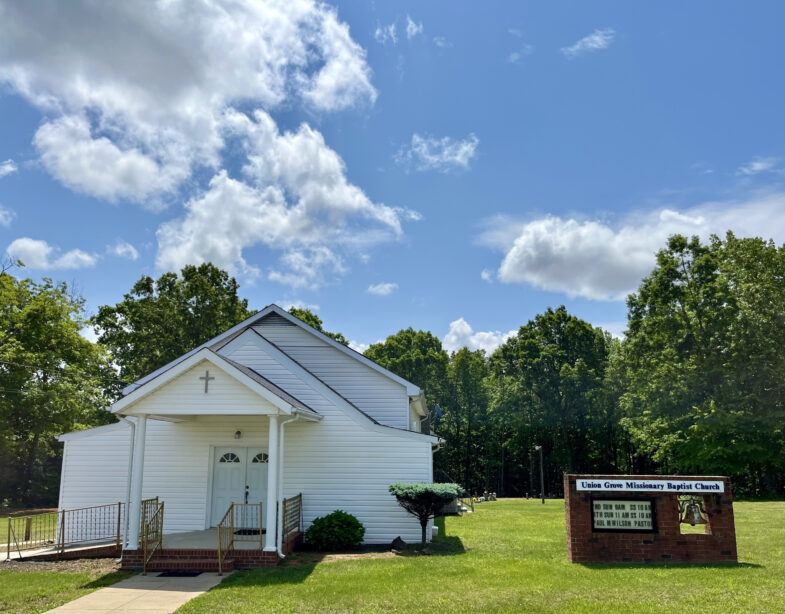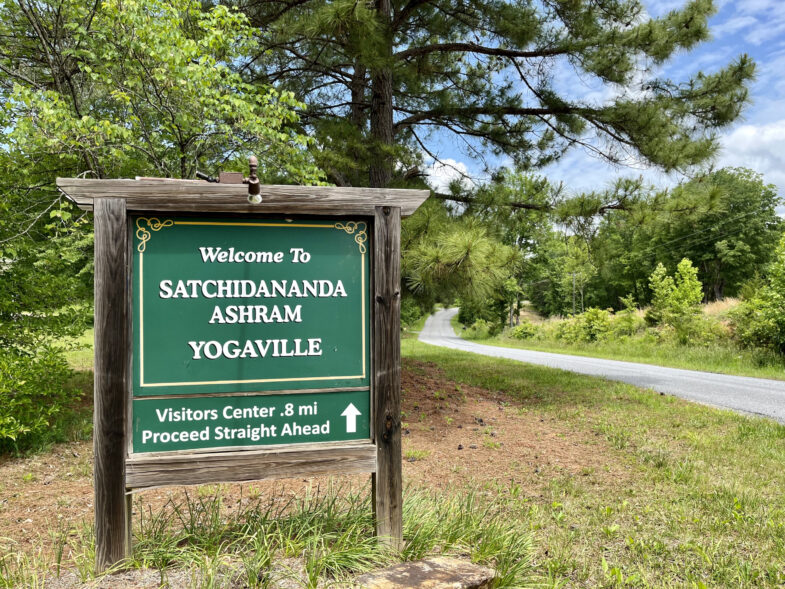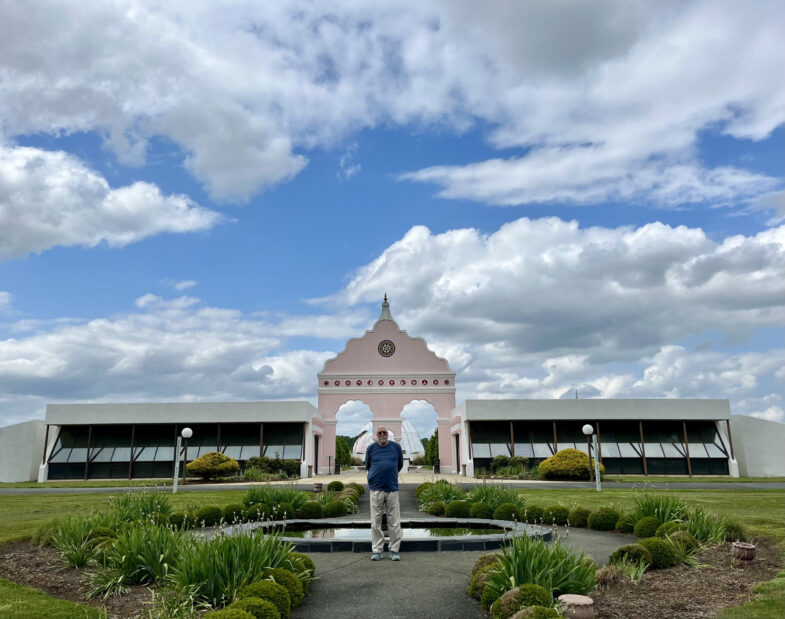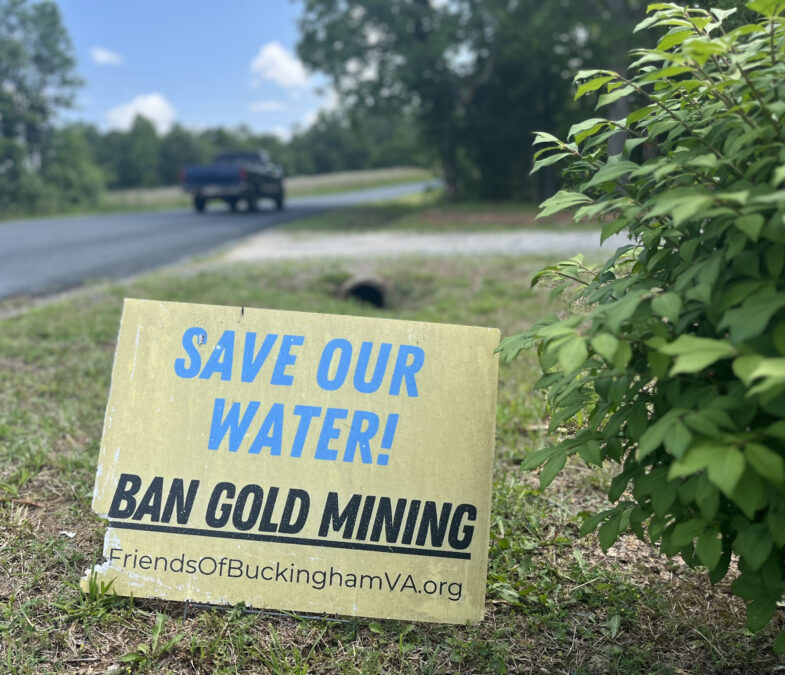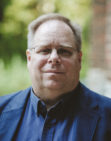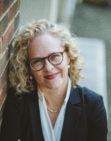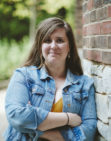A Church, an Ashram, and a Pipeline
Martien Halvorson-Taylor [00:00:00] I'm Martien Halvorson-Taylor.
Kurtis Schaeffer [00:00:02] And I'm Kurtis Schaeffer.
Martien Halvorson-Taylor [00:00:04] And this is Sacred and Profane. If you're new to the show, this episode is part of our season “Between Heaven and Earth,” which focuses on climate change and religions in the United States. And the big question that we're looking at is how religion has shaped the way Americans think about and live on the land, and how the land has shaped religion.
Kurtis Schaeffer [00:00:36] The land we're talking about today is in Buckingham County, Virginia, about an hour south of us here in Charlottesville. On previous episodes, we've explored the role religious institutions have played in two drivers of today's climate crisis, colonialism, and America's powerful petroleum industry. But the story in Buckingham County is a little different. It's the story of faith leaders who teamed up to stop a pipeline.
Martien Halvorson-Taylor [00:01:07] To help us understand how religion factors into this unique collaboration. We've brought back Molly Born. She's a journalist from West Virginia who has covered the far reaching impact of fossil fuel extraction in Appalachia. You've heard her on the show before. When she helped us to understand how a Hare Krishna community in West Virginia arrived at the controversial decision to sell its mineral rights to gas companies. We'll let Molly take it from here.
Molly Born [00:01:44] When I came to Buckingham County, one of the first people I talked to was John W. Laury. He's a farmer, and he took me for a bumpy ride in his truck around the low, rolling hills of his farm in Union Hill. He raises cattle. He has plans for a garden too, with tomatoes, squash, and corn.
Molly Born [00:02:04] Do you enjoy spending days out here?
John Laury [00:02:05] Oh, yes.
Molly Born [00:02:06] What do you enjoy about it?
John Laury [00:02:08] The quietness. And you’re able to think and you can enjoy Mother Nature. Hear the birds. See the squirrels and rabbits.
Molly Born [00:02:28] Like a lot of Black families in Buckingham County, John has deep roots in the community. His family has farmed his land for generations. He showed me a small cemetery on his property, a cemetery old enough that it holds the remains of a woman born into slavery.
John Laury [00:02:44] When you came in, you came by Union Grove Church. That building just above, after Union Grove Church, is Shelton store. She's the mother of the man who owned that store. She was enslaved, in slavery. How’re you gonna own another human being?
Molly Born [00:03:08] Besides farming, John is a retired Army veteran and a deacon at Union Grove Missionary Baptist Church, just down the road.
John Laury [00:03:16] My mother and daddy, they got married here. This is why the land is appealing to me, because they are married here. And growing up, we used to walk that road going down the highway, and we sat on the low ground down there next to the creek. We used to steal berries out the field.
Molly Born [00:03:40] Like John's family, the church has deep roots in the county. It's a classic country church with white siding and a neat lawn. And there's a cemetery out back containing the remains of descendants of enslaved people. Less than 20 minutes from the church where John Laury is deacon is the ashram known locally as Yogaville, the international headquarters of an organization founded by an Indian religious teacher in the late 1970s, dedicated to promoting interfaith understanding and world peace. The founder, Swami Satchidananda is probably most famous to the rest of us for giving the invocation at Woodstock in 1969.
Swami Satchidananda [00:04:24] I'm overwhelmed by the chant. The entire youth of America gathered here in the name of a way, not a few.
Molly Born [00:04:39] As you can imagine, the ashram and the people who came with it were a big change in a conservative county of under 20,000 people. The campus at Yogaville is big. It's over 600 acres and includes a yoga retreat, accommodations for both visitors and the devotees who live on site. And it's crowned by a neon-accented lotus. Not a literal flower, but an acronym: The Light of Truth Universal Shrine, which highlights the shared wisdom of major world religions and is a symbol of the Swami's teachings. Theologically, Yogavillle and the Baptist congregations and Union Hill could not be any more different. Missionary Baptist is a term often used by black churches, especially in the South. But like other Baptists, they believed that scriptures in the Bible are the word of God. Swami Satchidananda’s teachings say God can be approached through any form or name, and it's up to the individual to choose the path best suited to them. But despite those differences, in 2014, they would unite to form the backbone of an organization called the Friends of Buckingham. How that happened has a lot to do with the efforts of Chad Oba, a gutsy, retired mental health counselor in her 70s. She describes herself as a friend of Yogaville, although she has a more formal title as well.
Chad Oba [00:06:11] My title. My title. Oh. My title is president. Not a title I enjoy actually. It's not the role, as much as being called president – of the Friends at Work Buckingham.
Molly Born [00:06:25] We met along with her co-founder, Kenda Hanuman, in Hanuman’s garden near Yogaville. It was peaceful, with its birdsong and flower beds of pink primrose, peonies, and irises.
Chad Oba [00:06:39] There's a deer behind you if you're interested. He's over here.
Hanuman [00:06:45] It's a mama.
Molly Born [00:06:47] Like a lot of rural places. Buckingham County has wildlife, but it's always had industry too. Most of the forested areas in the county are in private hands and used for commercial timber production. But in 2014, Chad heard about plans for something new, something big. Virginia's power company, Dominion Energy, announced the Atlantic Coast Pipeline, which would bring fracked methane gas from West Virginia to North Carolina. It would pass right through Buckingham County.
Chad Oba [00:07:18] Somebody messaged me and said, “Hey, Chad, do you know anything about that compressor station in the pipeline?” And she used to live here in the Yogaville community, but she lived in Nelson County. I said, “How can I know more?” And she mentioned Ernie Reed, who was heading up Friends of Nelson at that point. I contacted him and said, “Hey, Ernie, I know they're going to get a song and dance and we got to have some alternative information available.” And so he said, “I'll send you some right away.”
Molly Born [00:07:50] It wasn't just the pipeline. A compressor station was set to go up in Union Hill. These stations are built at spots along the pipeline to help maintain the pressure and flow of gas. And this was one of only three planned in the whole 600-mile pipeline, and the only one in Virginia. Compressor stations make a lot of noise, and they can also potentially release gas in harmful quantities. There's also a risk of fire and explosions. The name Dominion is fitting. The company owns power plants and pipelines in several states, as well as one of the country's biggest storage facilities for liquid methane gas. It supplies power to most Virginians and donates handsomely to political candidates on both sides of the aisle. Chad has been a vocal critic of Dominion before, in the 90s, when it went by Virginia Power. The company wanted to run a high voltage electricity transmission line from Indiana to West Virginia. She said people were worried it wouldn't really do that much for them, but take or devalue their land. She spoke out against the plan at a meeting, and afterward, a group of black men she didn't know approached her.
Chad Oba [00:09:14] They said, we want to accompany you to your car. And I didn't get it. I didn't know I'm okay. “You know, I'm okay.” And I was a lot younger. Didn't have arthritis.
Hanuman [00:09:26] You could run.
Chad Oba [00:09:27] Yeah. And it took me a while to get that. They were looking out for me. It was for my safety because I had spoken out.
Molly Born [00:09:42] Chad is a transplant, but she's lived next to a Union Hill for 30 years and knows the area well, including the racial tension between its black and white residents, many of whom have lived through Jim Crow. Schools in Buckingham County weren't fully integrated until 1970 – 16 years after Brown v. Board of Education outlawed racial segregation. Chad also knew if the community wanted to stop the pipeline and compressor station, they would need to work together. Hoping for common cause Chad, who was white, began to reach out to local black churches. And that's how she met Pastor Paul Wilson sitting in his car in the church lot just before Bible study.
Chad Oba [00:10:29] And I tapped on the window and said, “Can I talk to you?” And he rolled down the window, and I said, “Do you know about a pipeline and a compressor station?”
Paul Wilson [00:10:41] And I'm thinking that Dominion knows everything. I'm ready to follow their lead. But we started punching some holes in what Dominion was saying. And I prayed about it, and God spoke to me and simply said, if I follow through, if we follow through, be patient, that the Atlantic Coast Pipeline was not going to happen.
Chad Oba [00:11:06] It was an important relationship and it was important to me to meet in the church, because that's the safe place. That's the safe place for the Black people who lived there. And so we began to have all of our meetings there after that.
Molly Born [00:11:26] We'll hear more from Pastor Paul a little later. In addition to concerns about pollution. Residents here are worried about the threat the proposed compressor station might present to the cemetery near the church. It weighed on John Laury, whose farm is just up the road from Union Grove.
John Laury [00:11:43] I was deeply concerned about the water and the air and also the ecosystem, period. I used to drive down 56 and pray that it would not happen. I was so encouraged one night at our Board of Supervisors meeting when Pastor Paul gave them an example of David and Goliath. We're fighting a giant.
Molly Born [00:12:17] John protested at Dominion board meetings in Richmond and Washington, D.C., and addressed the Governor's Advisory Council on Environmental Justice. But he considers prayer and his trust in God to be among his greatest contributions to the cause. It might stand to reason that a true believer who strictly follows the teachings of the Bible might have some misgivings about working with a group of yogis who believe there are many paths to God. John and his wife Ruby felt no such way.
Ruby Laury [00:12:52] I admire their faith. And I'm sure they admire the faith that we have in our Lord and Savior. I was sort of skeptical at first because I didn't know. I didn't know anything about that. But once I got to know them, I felt comfortable.
John Laury [00:13:12] There was no problem when we realized this project was harmful to humanity. There is one way to God. That's through Jesus Christ. That’s stated in the Bible. This did not affect the different faith. This was strictly about survival and standing up for what is right. We even adopted the slogan “We are all Union Hill. If Union Hill hurt that means the rest of us hurt.
Molly Born [00:14:10] I talked about this with Swami Dayananda, a Hindu monk who was raised in Shinto, the major religion in Japan where she was born. She spent most of her 40 years at Yogaville laser-focused on her own spiritual development and admittedly, wasn't that connected to the community surrounding the ashram. But she knew residents were skeptical of Yogaville when the community started going up in the late ‘70s and early ‘80s in the rural, rolling foothills of the Blue Ridge Mountains. And that skepticism didn't vanish overnight.
Swami Dayananda [00:14:41] During the time that we were peacefully protesting, when we had meetings with community members in Buckingham – and one resident said, when Yogaville, people wanted first to come in this area, you know, some of us protested. We said, “We don't know who these people are. Yoga? Swami? Guru? Could be a cult!”
Molly Born [00:15:15] During my visit, I had some free time and Swami Dayananda suggested a meditation at the Kailash site, where a shrine features a Hindu god and a stunning overlook with the Blue Ridge Mountains on the horizon. I arrive in the middle of the daily Hindu worship service in Sanskrit.
Molly Born [00:15:37] Yogaville’s main feature is its lotus shrine, built in 1986. Religious texts, photos, and various artifacts representing Judaism, Christianity, Sikhism, Hinduism, and other religions are featured behind glass displays in the sanctuary upstairs. A blue beam from the altar corresponding to each religion meets the others in the ceiling. Pastor Paul came here, too, shortly after the Friends of Buckingham group assembled.
Paul Wilson [00:16:11] I went to the, to the Lotus shrine, and when I went in the place. Oh my God. It was like the Holy Spirit just came all over me, and I started trembling and shaking and crying. It was such a holy place. And when I went in, I just went under the power of prayer, under the authority of the Holy Spirit. And I went to the arch where, Christianity, that arch that leads to heaven. I want to say – I need to make sure – I don't believe that there are all of these different paths to God. I want to believe that there's only one true path. But I was in awe. I didn't expect that. I almost felt like when Malcolm X went to Mecca, his whole perspective changed. There are things that Martin Luther King experienced that changed his whole perspective. And I think in everybody's walk in life, you have to get to that point where you, where your perspective changes and then you really know what you about, what you’re for.
Molly Born [00:17:27] Around the same time, Swami Dayananda in her orange robe worn by Hindu monks spoke to congregants at Pastor Paul's church.
Swami Dayananda [00:17:36] He just invited me to speak at the pulpit, and I had an opportunity to speak about nonviolence and this whole aspect of resisting the pipeline. And I had an opportunity to speak about Gandhiji, Martin Luther King Jr., you know, his civil rights movement and how related this is to what we are doing. It's upon us to do the same thing in the same way. And, when I was speaking in the Baptist, you know, they are such an incredible people of faith. And when we're saying something, they, you know, they say, “Amen. Hallelujah.”
Molly Born [00:18:19] At a conference, he introduced Swami Dayananda to fellow Baptist leaders.
Swami Dayananda [00:18:24] He said, “Meet my sister, spiritual sister.” And I just knew then that there was just no wall between us, that we were one in the spirit. And we found that common spirit through getting to know each other, facing this big obstacle that was coming our way. We believe in ourselves, our love for each other, for our family, our community, our environment. We are one.
Molly Born [00:19:02] The two communities remained united against the pipeline and compressor station. In 2016 Pastor Paul was one of around two dozen people arrested during an ACP-related protest and charged with trespassing. A judge sentenced him to a week of community service.
Paul Wilson [00:19:19] I chose to do mine at Yogaville. Stayed over there for a week. Played Santa Claus. Got to talk with people. Ate basically vegetarian food for a week. You know, I'm a meat and potato guy. Steak guy.
Molly Born [00:19:39] Dominion Energy wasn't persuaded by environmental justice concerns. In 2018, the Friends of Buckingham went to each home in the community and did their own unofficial census, a project led by Lakshmi Fjord, an anthropologist and visiting scholar at the University of Virginia.
Lakshmi Fjord [00:19:57] So when it was understood that the Atlantic Pipeline was building – hoped to build a compressor station in what I knew was a majority Black community, it was really part of my ministry as an interfaith minister in integral yoga to just say, okay, well then this is what I have to do. I have the skills. I have the, the zeal and the passion. In most of the states of the United States, but particularly in former Confederate states, the census tract data for Black communities and indigenous communities is very, very poor. Both of those populations of people have terrible records of their data being used against them. They don't open their door to census takers. Why would they? Let's start doing a house-by-house study to know how many people are living here, what race they identify with? How long have they lived there? How old are the buildings they live in? Where are the churches that they go to, the schools that they went to, and so forth? Let's get that information. And we need that in order to counter the siting of these facilities in these places. We need to use what few legal remedies we had for environmental justice. Our community needs to do that to protect itself.
Molly Born [00:21:33] Fjord found that more than 80% of the nearly 200 residents within a mile of the proposed compressor site were Black, or people of color.
Greg Buppert [00:21:42] That became the foundation. For the arguments we made in court.
Molly Born [00:21:50] That's Greg Buppert from the Southern Environmental Law Center. The group sued the state's Air Pollution Control Board on behalf of the Friends of Buckingham.
Greg Buppert [00:21:59] The board, the ultimate decider, hadn't really grappled with the evidence when we used a Virginia statute that said the board had to consider the suitability of the site. Really, the first time that state regulators were forced to grapple with environmental justice for an air pollution permit. To me, it felt remarkable. Here's this remarkable story, a remarkable part of American history, the descendants of the formerly enslaved people who founded the community still live there. And Dominion was going to force this compressor station into this community. Communities like Union Hill are all over our country, and they're certainly all over the South and all over Virginia. And these communities are asked repeatedly to bear the disproportionate burden of energy infrastructure and all the pollution that comes along with that.
Molly Born [00:23:01] In 2019, the Southern Environmental Law Center joined others in challenging the pipeline's proposed crossing of the Appalachian Trail, saying it was illegal without Congress's approval, since the landmark is part of the national park system. That narrow legal issue went all the way to the U.S. Supreme Court. Activists had also been working hard to lobby Virginia's congressional delegation. In those months before a final decision came down, Dominion sought that approval to cross the Appalachian Trail – from Congress. They didn't get it.
Greg Buppert [00:23:36] The company was unsuccessful because of the grassroots efforts, because of groups like Friends of Buckingham who spoke to their elected officials and explained their view on the project and made sure that elected officials in Virginia who would have to vote for this law were informed. And ultimately never passed. I certainly believe it helped Dominion see the writing on the wall that this – that its project was in deep trouble, and it needed to get out of the Atlantic Coast Pipeline. And the big picture is there's really no way a project like that can be defeated without the deep involvement of the community.
Molly Born [00:24:28] The Supreme Court actually sided against the environmentalists, overturning a lower court decision. But a month later, Dominion canceled the whole project. The fight wasn't without its divisions. Pastor Paul used to preach at two churches about a mile apart in Union Hill, but he was forced out by one during the ACP fight. By his account, congregants at Union Hill Church thought he was standing in the way of progress that Dominion promised when it announced $5 million to build a community center and improve emergency services. There were other issues before this he said, but ACP was the breaking point. He fought the removal before ultimately resigning, and now is only preaching at Union Grove.
Paul Wilson [00:25:11] They threw me out. You see, in small churches. People don't want to go against their family members. “Well, Grandma said. “Uncle John said.” They'll go along to get along. And then the Black community was divided, okay. Because that was – people would say, you can't slow, you can't stop Dominion. Listen, get out now and demand some money. Take the money.
Molly Born [00:25:46] We tried but weren’t able to reach the other church. 2020 brought a victory for the Friends of Buckingham. But around the same time they got news of a new challenge. A Canadian company had begun exploratory gold mining in northwestern Buckingham County, just miles from Union Hill. John and Ruby Laury put up a new sign in their yard, and someone put one up in front of Union Grove Church, too. “Save our water. Ban gold mining.”
Heidi Dhivya Berthoud [00:26:15] A couple miles as a crow flies from here. And that was a month before the ACP went down on its knees.
Molly Born [00:26:24] That's Heidi Dhivya Berthoud, the Friends of Buckingham's secretary and record keeper and current director of the Virginia Community Rights Network, another environmental group. Some of the members overlap, but the network's approach is less traditional – instead, focusing on the rights of nature.
Heidi Dhivya Berthoud [00:26:43] We have the right and responsibility to protect our air, our water, our land, our community, our economies from the toxic trespass that would come that we know would come with metallic mining. Our ideal would be to have our rights-based ordinance passed, which would effectively stop that with a prove-it-first requirement, which essentially says it's like Hippocrates’s oath – before getting a permit, prove that there's another mine of comparable scale that has caused no harm.
Molly Born [00:27:26] Activists say the mining of industrial metals can lead to pollution, and that cyanide used in processing could pose a health risk. Hanuman observed one major difference between these potential threats to the environment and Buckingham County. It didn't take much convincing for people to balk at the gold mining. Hanuman, Chad, Heidi and others have set up tables at a few community events to let people know about their concerns.
Hanuman [00:27:54] It felt so good to have a success with the ACP, so even though we were tired – I don't know with the gold mine, I definitely feel more support. Anybody that we talk to in the community and beyond says we don't want a gold mine. So and we didn't have that with the Atlantic Coast pipeline. We didn't have that kind of unanimity.
Kurtis Schaeffer [00:28:39] Sacred and profane was produced for the religion, race and Democracy Lab at the University of Virginia. This episode was made possible by a grant from the National Endowment for the Humanities. Today's show was reported by Molly Born. Our senior producer is Emily Gadek.
Martien Halvorson-Taylor [00:29:01] Music in this episode came from Blue Dot Sessions. For more on our work, head to Religion Lab virginia.edu or follow us on Twitter at the Religion Lab.
In 2014, Virginia’s Dominion Energy announced it would be building a new pipeline intended to carry fracked methane from West Virginia to a storage facility in North Carolina. The planned route brought the pipeline right through Virginia’s rural Buckingham County, with a compressor station proposed near a historic Black church and cemetery in the small community of Union Hill.
Despite Dominion’s assurances that the pipeline and compressor station would be safe, a group of locals grew concerned — and began to fight back. Opposition to the pipeline forged a new group called Friends of Buckingham, built on the backbone of two very different local faith communities: Union Grove Missionary Baptist church, a Black congregation with roots stretching back to Reconstruction, and the Satchidananda Ashram, an interfaith yoga community founded by the Hindu yoga teacher Swami Satchidananda Saraswati in 1986. Although they have fundamental doctrinal differences, the communities were united in their conviction that the pipeline would bring environmental harm to their county — harms that would be felt most acutely by its black residents. As John Laury, a member of Friends of Buckingham put it:
“There was no problem when we realized this project was harmful to humanity. There is one way to God. That’s through Jesus Christ. That’s stated in the Bible. This did not affect different faiths. This was strictly about survival and standing up for what is right. We even adopted the slogan ‘We are all Union Hill.’ If Union Hill hurts, that means the rest of us hurt.”
This piece was reported for us by Molly Born, a journalist and producer who’s reported extensively on the legacy of fossil fuels in Appalachia. She previously reported a piece for the show on a Hare Krishna community in West Virginia wrestling with their decision to allow fracking on their land (you can listen to that piece below).
Additional Reading
Vogelsong, Sarah. “ What Sank the Atlantic Coast Pipeline? It Wasn’t Just Environmentalism.” https://Virginiamercury.Com/2020/07/08/What-Sank-the-Atlantic-Coast-Pipeline-It-Wasnt-Just-Environmentalism/, 8 July 2020, https://virginiamercury.com/2020/07/08/what-sank-the-atlantic-coast-pipeline-it-wasnt-just-environmentalism/. Accessed 29 Apr. 2024.
Dempsy, Joe. “Getting Schooled.” Washington City Paper, 11 Feb. 2005, https://washingtoncitypaper.com/article/245921/getting-schooled/. Accessed 29 Apr. 2024.
Additional Credits
This episode was made possible by a grant from the National Endowment for the Humanities. Special thanks to Erin Burke, Rebecca Bultman, and Devin Zuckerman for their help on this episode.



